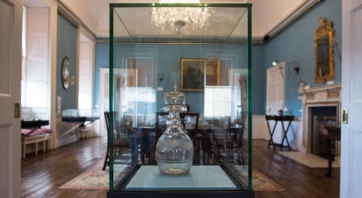
Museum Standards Programme for Ireland
MSPI promotes professional standards in the care of collections in Irish museums and galleries. The programme recognises the achievement of those standards through accreditation.

2012- ar aghaidh
An initiative to promote heritage-led regeneration and to improve the quality of our historic towns and villages for residents and tourists.
An initiative to promote heritage-led regeneration and to improve the quality of our historic towns and villages for residents and tourists.
Many of our city, town and village centres are historic places with their own distinct identities. Sustaining these is a complex process that in many cases involves the conservation and re-use of existing buildings, the care of public spaces and the provision of community facilities. The conservation and interpretation of this heritage makes our towns interesting, unique and attractive to residents and visitors.
In support of the Town Centre First: a policy approach for Irish towns (2022), the Historic Towns Initiative (HTI) is a joint undertaking by the Department of Housing, Local Government and Heritage and the Heritage Council which aims to promote the heritage-led regeneration of Ireland’s historic towns.
The government strategy Housing for All (2021) commits that ‘the [Historic Towns] initiative will be adjusted to encourage private owners and/or occupiers to bring vacant floor area in historic buildings back into use and projects that address dereliction and vacancy will be particularly focussed on, subject to going through the planning process as necessary.’
The Climate Action and Low Carbon Development (Amendment) Act 2021 sets out a roadmap for Ireland’s transition to a climate resilient, biodiversity rich and climate neutral economy by no later than the end of the year 2050. This shift to a climate neutral future means that the conservation and repurposing of existing historic building stock has become increasingly more important. Existing buildings contain embodied energy, which is lost if they are demolished; while the greenhouse-gas emissions involved in the demolition and replacement of a building have been calculated to take decades to recover.
The sustainable use of the historic buildings of our towns has added benefits in increasing the quality of life for all by offering reduced commuting as these buildings are generally closer to amenities and services. More directly the impacts of climate change on our built heritage are increasingly evident and should be taken into account in any proposals under the HTI. These impacts may be both immediate and cumulative – so that damage from catastrophic events such as floods and storms are likely to increase at the same time as the slow-onset of changes in deterioration processes.
The HTI has been in operation since 2018 and to date has supported heritage-led regeneration projects in the following towns: Youghal, Bantry, Midleton, Passage West and Macroom and Castletownbere, Co Cork; Kells, Navan and Duleek, Co Meath; Carrick on Suir, Nenagh and Tipperary town, Co Tipperary; Portlaoise, Co Laois; Kilmallock, Co Limerick; Ballina and Ballinrobe, Co Mayo; Roscommon town, Strokestown and Boyle, Co Roscommon; Lisdoonvarna and Kilrush, Co Clare; Callan, Co Kilkenny; Ballymote and Sligo town, Co Sligo; Letterkenny, Ramelton, Raphoe, Glenties, and Ballyshannon, Co Donegal; Clones and Monaghan town, Co Monaghan; Lismore and Tramore, Co Waterford; Listowel, Tralee and Castleisland, Co Kerry; Enniscorthy and Wexford town, Co Wexford; Birr, Co Offaly; Naas, Co Kildare; Carlow town, Co Carlow; Greystones, Co Wicklow.
View how funding through the HTI has benefited Cathedral Quarter, Letterkenny in the video below.
A total fund of €2 million (capital funding) is available to local authorities under the HTI 2026. A 20% minimum matching contribution will be required (please see below). The extent of matching resources will be taken into account in the assessment of applications.
Each local authority is invited to apply in respect of historic towns in their functional area where a programme of suitable heritage-led regeneration projects (Stream 1) or the need for a heritage-led regeneration plan (Stream 2) has been identified by the local authority, working with a town partnership team or local steering group.
The Historic Towns Initiative aims to provide support to historic towns engaged in a programme of heritage-led regeneration.
In 2026 we are interested in projects that address residential vacancy and dereliction in town centres, that propose the re-use of historic structures and that can act as a demonstrator for future projects.
View full details on the Historic Towns Initiative for 2026 here.
Watch previous webinars on HTI on our youtube channel
Heritage Council publication Ballybrilliant: heritage-led regeneration in 5 Irish towns (2018)
Historic Towns Initiative Pilot Programme Review 2013-14
Information on case studies can be found in the Royal Institute of Architects of Ireland publication Creating Vibrant Places: the RIAI town and village toolkit
and in the publication Old House, New Home
Our urban centres contain a large amount of underused building stock. The sensitive reuse of such floor space at ground level and on upper floors should be encouraged. In relation to this, attention is drawn to the publication Bringing Back Homes: Manual for the reuse of existing buildings

MSPI promotes professional standards in the care of collections in Irish museums and galleries. The programme recognises the achievement of those standards through accreditation.

A National Heritage Council Conference

Encourage greater awareness in your school of Ireland’s rich built, natural and cultural heritage with an engaging and stimulating visit from one of our Heritage in Schools experts.